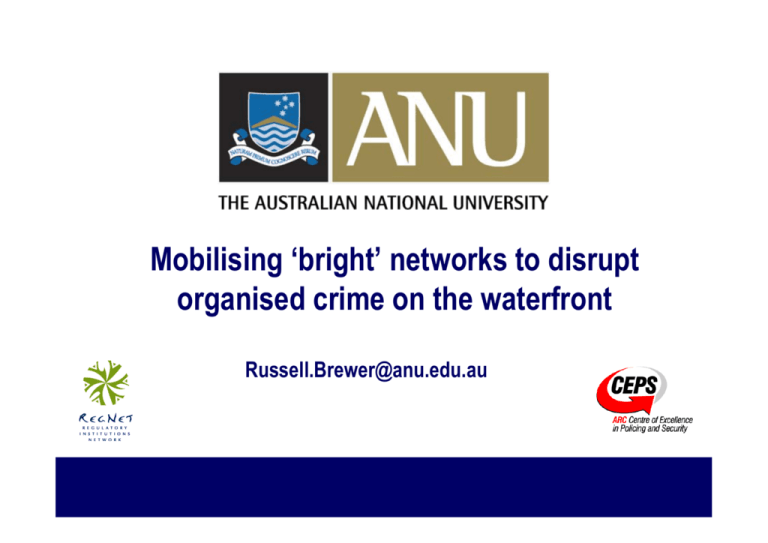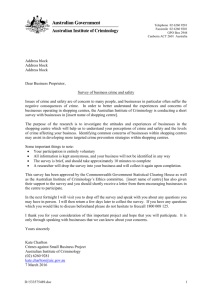Mobilising 'bright' networks to disrupt organised crime on the
advertisement

Mobilising ‘bright’ networks to disrupt organised crime on the waterfront Russell.Brewer@anu.edu.au Overview Methodology Dark networks and legitimate actors Bright networks and gatekeepers Mobilising law on the waterfront Methods: a comparative approach • • • • Adelaide Canberra Melbourne Sydney • • • • • Long Beach Los Angeles Oakland San Francisco San Diego 3 Dark networks and legitimate actors Dark Networks as Problems (Raab & Milward 2003, p.416) Reciprocal relationships between bright and dark networks Criminal networks extend into the licit world for support Whilst structurally at the periphery of the network, legitimate actors can often be pivotal in the pursuit of illicit gains The maritime transport industry acts as a gateway for the entry of illicit commodities into Australi “While it is accepted that the majority of individuals involved in the maritime sector are focused on legitimate activity vital to the Australian economy, there are a number of groups and individuals who are exploiting vulnerabilities within these environments to undertake criminal activities.” Australian Crime Commission 2009, p. 4 “The extent of criminal infiltration is subject to organised crime’s ability to recruit and utilise criminally complicit port workers.” Australian Crime Commission 2009, p. 7 Serious criminality on the waterfront • Illicit drug importation • Money laundering • Firearms and weapons movement • Smuggling flora and fauna • Theft • Tobacco smuggling • Mislabelled/counterfeit goods • Tax/duty evasion “Criminality within the port environment is spread across the various work and skill types, and involves a range of industry groups within or linked to the maritime sector.” Australian Crime Commission 2009, p.4 Bright networks and gatekeepers Legitimate actors well positioned to play an integral role in the crime control efforts of bright networks Gatekeeper liability (Kraakman 1986) • Enlisting third parties and their associates as ‘defacto cops on the beat’ Maritime industry participants positioned to enable criminal activity, as well as stymie any such misconduct “We know everyone who is supposed to be walking around the port. We represent 11,000 eyes and ears on the waterfront.” Senior official, Maritime Union of Australia Mobilising the law on the waterfront State and non-state actors come together in bright networks • Relationships formalised through legislation, MoUs and informal agreements Legal intelligence is a significant issue when considering the efficacy of bright networks Impossibility of crafting an effective system of legal intelligence? References Australian Crime Commission 2009, Submission to the Parliamentary Joint Committee on the Australian Crime Commission, Inquiry into the Adequacy of Aviation and Maritime Security Measures to Combat Serious and Organised Crime, Canberra. Black, Donald 1980, The Manners and Customs of Police, Academic Press, New York. Kraakman 1986, ‘Gatekeepers: The Anatomy of a Third-Party Enforcement Strategy’, Journal of Law, Economics and Organization, 2(1), p 53-104 Raab, Jorg & Milward Brinton 2003, ‘Dark Networks as Problems’, Journal of Public Administration Research and Theory, 13(4), pp 413-439








